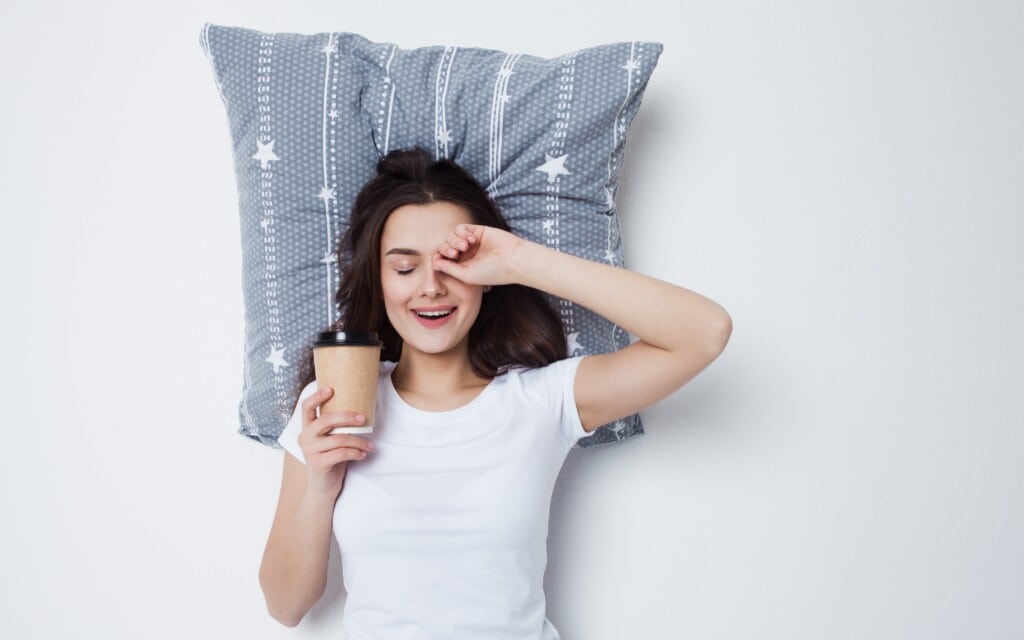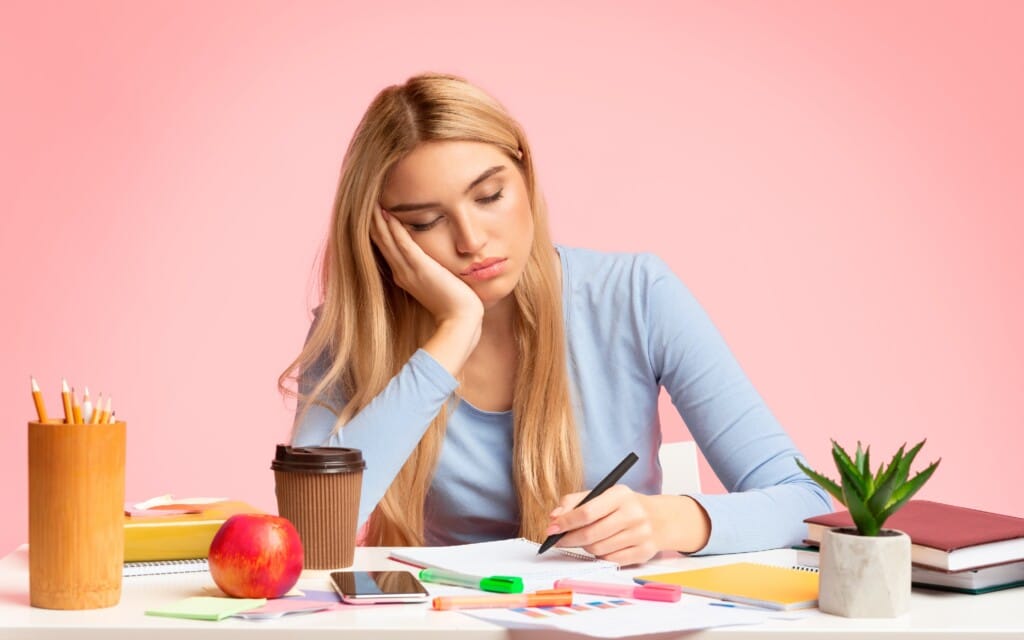Are Melatonin and caffeine a bad mix?
You probably know taking melatonin to help you sleep, and following up with a mug of coffee isn’t a good idea. Even if you’re one of those people who claim to feel “sleepy” after coffee, the two substances are designed to have quite different impacts on the body.
Coffee helps to keep you focused and alert, while melatonin supports a healthy circadian rhythm, and encourages restful sleep.
Used separately, each product has unique benefits. However, when combined, melatonin and caffeine can end up damaging your sleep.
So, how long after drinking coffee can you take melatonin, and what can you do to reduce problems with your sleep after consuming caffeine?
Let’s find out.
Caffeine and melatonin: What You Should Know about Coffee
First, caffeine and coffee aren’t necessarily bad things.
Research shows drinking coffee can reduce your risk of various diseases, help with losing weight, and make you more productive.
However, there is such thing as having too much of something good. Drinking excess caffeine or consuming it too late in the day, harms your sleep.
The body takes up to 6 hours to metabolize the caffeine you consume. The more coffee you drink, the worse your sleep is likely to be.
According to the dietary guidelines of the FDA, we should all be limiting our daily caffeine intake to around 400mg.
Brewed coffee sits at around 95mg for an eight-ounce cup, so you shouldn’t have trouble if you stick to less than four cups a day.
Do keep in mind other products in your diet might have caffeine too, such as chocolate and tea. If you’re trying to improve your sleep quality with melatonin, it’s best to double-check which products contain caffeine, and how much they have.

Caffeine and melatonin: Do they interact?
Most people know caffeine can have a disruptive effect on sleep. Too much caffeine will make it more difficult for you to fall asleep. Caffeine also delays the performance of your body clock, something melatonin is trying to fix.
Consuming caffeine even 6 hours before bedtime can reduce your total sleep by around an hour. Aside from harming your sleep quality, caffeine can also have other negative side effects in high doses, such as headaches, sleepiness, sweating, nausea, diarrhea, muscle tremors, and more.
Taking melatonin when your body is still trying to process caffeine for energy will clearly cause some confusion. The primary action of caffeine is to block adenosine receptors in the brain.
The adenosine in your brain promotes sleep, increasing melatonin production naturally. When you drink coffee, you block adenosine and boost wakefulness.
Research demonstrates coffee consumption has a significant impact on the amount of melatonin the pineal gland can produce. A lifetime of regularly drinking coffee (3 cups a day or so), can cause a permanent decrease in melatonin production, leading to daytime sleepiness and reduced sleep efficiency.
When you’re taking melatonin to improve your sleep quality, you may find you need to take higher doses to see any kind of impact.
Most doctors will also recommend reducing your caffeine intake to as low as you can get it, without quitting cold turkey. Stopping caffeine too fast can have similar withdrawal affects to any drug.
How to sleep after drinking caffeine
So, how do you sleep after drinking caffeine?
The negative melatonin and caffeine interaction means generally, you should avoid mixing caffeine and melatonin whenever you can.
It’s also worth cutting down on your coffee as much as you can, so you’re at least following the safe consumption guidelines. This will reduce your risk of a caffeine crash and make it easier to fall asleep.
If you’re used to drinking coffee at night, you could try switching to decaf coffee before bed. Studies suggest drinking decaf coffee may have less of a negative impact on your sleep quality, while still giving you the flavor you’re used to as part of your routine.
Aside from cutting down on coffee try improving your sleep hygiene. Switch to hot milk before bed instead of coffee, and make sure your bedroom is cool and inviting:
- Remove all electronics: Caffeine isn’t the only stimulant that keeps your brain awake. Your electronics, with their blue lights, can also keep you alert and focused, by convincing your body it’s still daytime. Switch off your electronics a couple of hours before bed.
- Increase melatonin: Since the caffeine in your body is blocking the natural melatonin you produce; your doctor might recommend taking more melatonin. Be careful not to go over the recommended dosage.
- Follow a schedule: Following a consistent schedule every day is a great way to prepare your body for sleep and boost your chances of a good night’s rest. Try to stick to the same routine regardless of whether it’s a weekday, or a weekend.
- Try some yoga or meditation: Sometimes all your brain needs is an opportunity to relax. Experiment with meditation and yoga to bring yourself into a comfortable, happy place when you’re preparing for sleep.
- Lower the thermostat: A cool bedroom is a must-have for a good night’s sleep. When you’ve still got caffeine in your system, you’re likely to be extra sensitive to any change in temperature, so keep things cool. This will allow your body to adapt to sleep mode.
- Take as walk: A little light exercise can be an excellent way to make yourself feel more tired. This doesn’t mean you should go running just before bed. Excessive activity can actually wake you up. However, some very basic exercise might be a good idea.
- Relax: Take some time to relax and unwind before you go to bed. Studies show a warm bath or shower can help you to relax enough to fall asleep much more easily. You could even mix your bath with some essential oils, like lavender, to help you sleep.

Melatonin and caffeine interaction FAQ
Still have questions about melatonin and caffeine?
Let’s try to answer them.
Can I take melatonin after drinking coffee?
Taking melatonin after drinking coffee not only damage your sleep, it could also increase your risk of more dangerous side effects. Melatonin can increase your risk of having various blood pressure problems, which is also why it’s not recommended you take melatonin with alcohol or other sleep inducing substances.
How long after drinking coffee can I take melatonin?
You don’t necessarily have to wait until a specific time to take melatonin after coffee. However, you should avoid drinking any caffeine within 6 hours of going to bed. It takes a decent amount of time for the body to metabolize caffeine and taking melatonin too early might negate the effects.
Can I drink coffee in the morning and take melatonin at night?
Generally, you should be able to consume coffee in the morning and still take melatonin at night without as much of an impact. However, keep in mind long-term coffee use can reduce your body’s natural ability to produce melatonin. This could mean regular exposure requires you to take more melatonin or makes the substance less effective.
Why does caffeine make me sleepy?
If you’re one of those people who feel sleepier, rather than awake after caffeine, the issue could be something called a caffeine crash. Caffeine binds to your adenosine receptors, but this doesn’t mean your brain stops producing adenosine. Once your caffeine wears off, there’s a build-up of adenosine ready to bind to brain receptors and make you feel tired.
What else shouldn’t I have with melatonin?
It’s best to avoid certain substances when taking melatonin, such as caffeine, alcohol, and other sedative medications that may cause you to feel sleepy. If you’re concerned about negative interactions, you can speak to your doctor about what to take when using melatonin.
Avoiding a melatonin and caffeine interaction
Long-term exposure to caffeine can gradually reduce your ability to naturally produce the melatonin you need for a good night’s sleep. At the same time, it also has the potential to fight against the effects of melatonin pills and supplements, by encouraging you to remain awake.
If you’re not willing to cut down on your coffee habit, a good option could be to make sure you’re at least sticking to the daily recommendation of no more than 400mg of caffeine per day.
To reduce issues of fatigue even further, it’s best to avoid sugary syrups, creams, and energy drinks with sweeteners. The sugar crash you feel after the sweet stuff wears off, will make your caffeine crash seem much worse.
Siestio. Sleep Matters.
Click here if you want to know about medications that cause insomnia.
If you want to learn more about melatonin for sleep, enjoy these interesting posts for better slumber:
—Should you take melatonin to sleep after taking Adderall?
—Should you consider using melatonin for sleep disorders?
—How long does melatonin last in your body after taking it?
—The surprising connection between dopamine and melatonin
—The negative consequences of mixing melatonin and alcohol
Medical disclaimer
You must not rely on the information provided on our website as an alternative to medical advice from your doctor or other healthcare professionals. For more information read our full disclaimer here.







